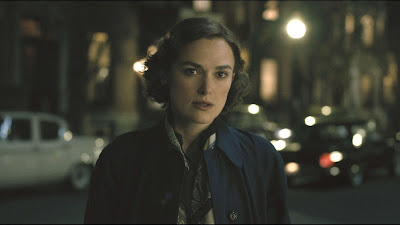The first thing you notice about “Boston Strangler” is its color palette. Exclusively muddy browns and greens, everything here, from Loretta’s home to a police interrogation room to various crime scenes, looks the same. If it evinces an appropriately grim sensation given the circumstances, the unyielding sameness of it all also unfortunately counteracts much of the tension, making it feel heavy rather than foreboding, the city never coming across under terrifying siege the way Loretta and Jean’s stories say it is. That lack of tension is furthered in Ruskin’s approach of solemnity over suspense. A scene in which Loretta enters a suspect’s apartment comes across rote, cribbed straight from David Fincher’s “Zodiac” (2007) and with little perspective of its own. The brief moment just before, a shot of Loretta from across the street generates the kind of omniscient fear the rest of “Boston Strangler” lacks.
In reporting the story, Loretta and Jean run up against all sorts of impediments to their progress, both within the police department and their own newsroom, though the intriguing idea of these institutions of power conforming to the same sort of misogyny that motivated the killer merely simmers below the surface rather than emerging as an overriding and forceful point. Ruskin, who wrote the screenplay in addition to directing, comes across more concerned with the nuts and bolts of the investigation, though the emergent ambiguity (the movie literally ends by reminding us the case is unsolved) is weirdly negated near the end through a theory proposed by Loretta that both the movie and Knightley’s air suggest as kind of Case Closed. Loretta’s scenes at home, meanwhile, in which Loretta ignores her husband (Morgan Spector) and kids to keep hunting the story are, weirdly in their own way, both boilerplate and the best part?
At some point Loretta says her kids are spooked, but we hardly see her kids, they are immaterial, it’s more about James, who mostly just says the things and acts the way Neglected Movie Spouses always act in these situations. That’s not so interesting, obviously, but what’s more interesting is how Knightley plays these scenes, like Loretta can’t quite bring herself to care that he’s peeved. Coon’s character gets no real backstory, save for one tossed off line about how her home life is a wreck, though Coon seizes on that line and essentially makes the whole performance out of it, like that mess hardly bothers her, like here, at work, this is what’s important. Ruskin never quite dares to truly weave the idea that a horrific story such as this one gave them purpose, or made their careers, but in the last scene when Loretta and Jean toast their drinks at a bar, he does suggest that in their careers they found their home.





No comments:
Post a Comment